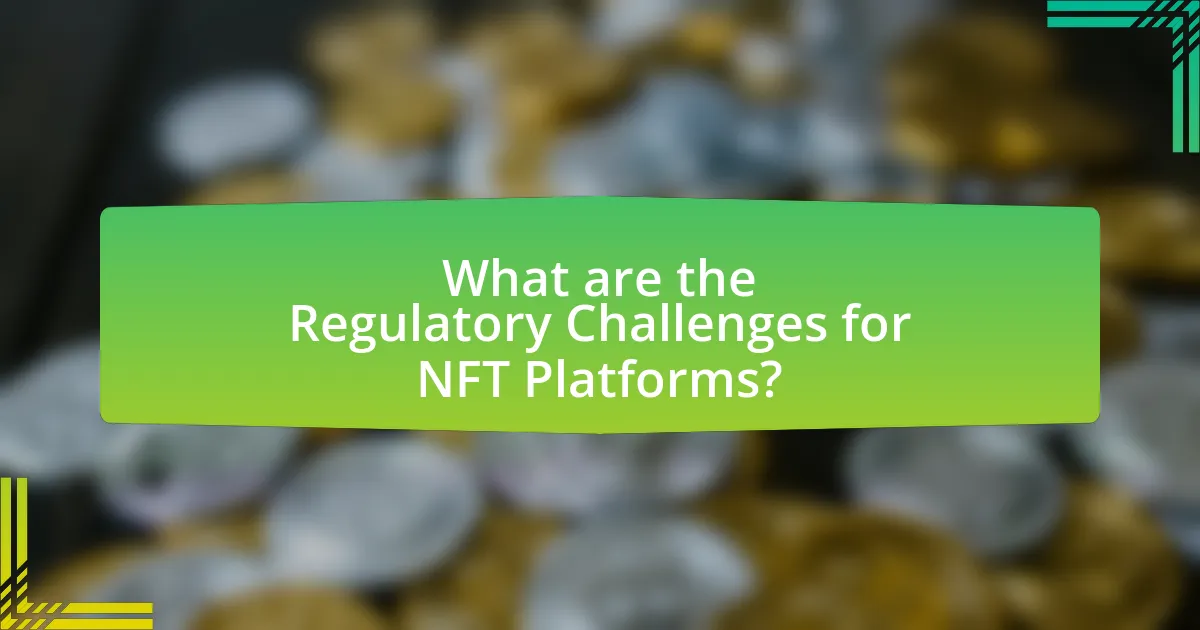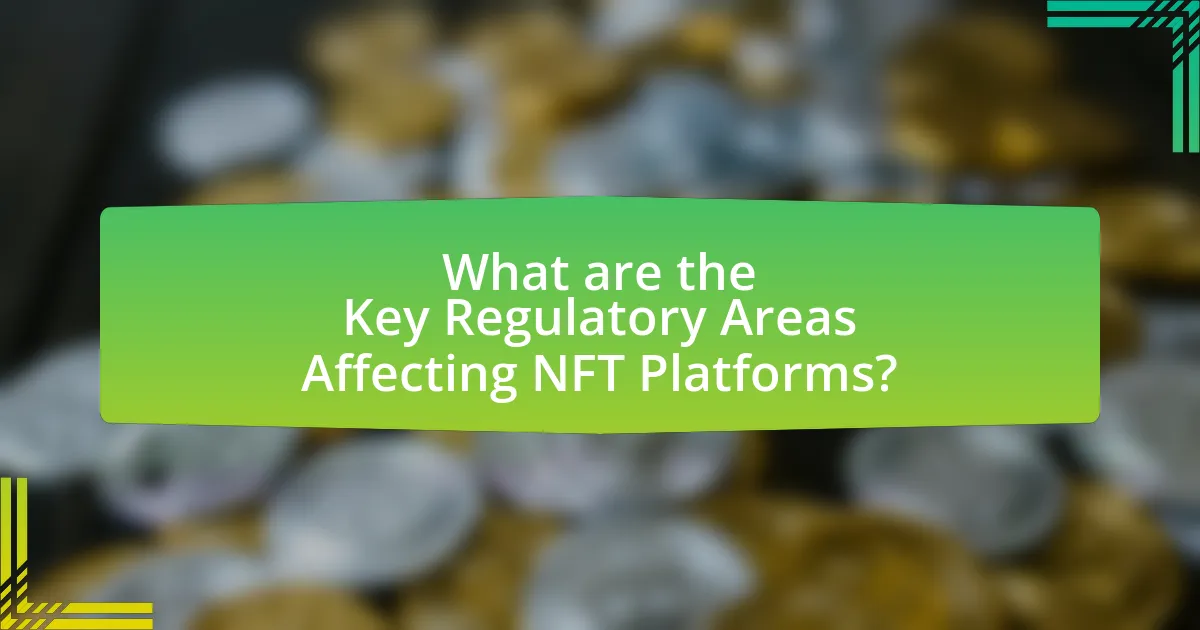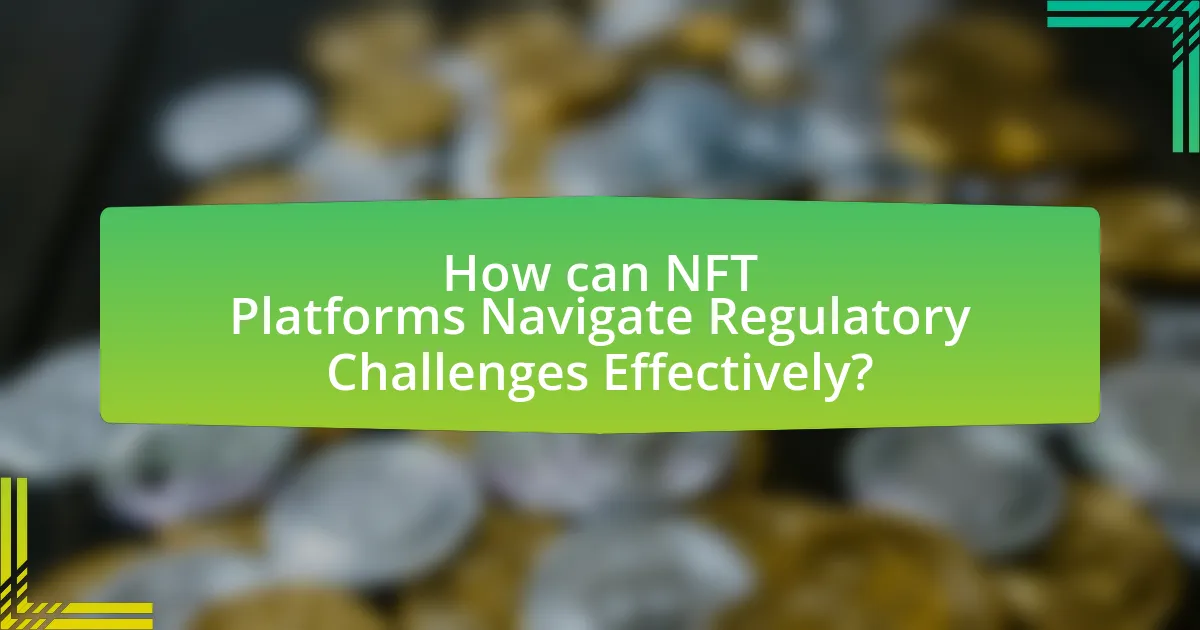The article focuses on the regulatory challenges faced by NFT platforms, highlighting the complexities of compliance with financial regulations, intellectual property rights, and consumer protection laws. It discusses how varying legal frameworks across jurisdictions, such as the classification of NFTs as securities by the SEC in the United States, impact operational practices and costs. Key regulatory areas, including anti-money laundering (AML) and know your customer (KYC) requirements, are examined, along with the implications of copyright and trademark laws on NFT transactions. The article emphasizes the importance of understanding these regulations for effective operation, risk mitigation, and maintaining platform credibility in a rapidly evolving digital asset landscape.

What are the Regulatory Challenges for NFT Platforms?
NFT platforms face significant regulatory challenges primarily related to compliance with existing financial regulations, intellectual property rights, and consumer protection laws. These platforms must navigate complex legal frameworks that vary by jurisdiction, which can include anti-money laundering (AML) and know your customer (KYC) requirements. For instance, in the United States, the Securities and Exchange Commission (SEC) has indicated that certain NFTs may be classified as securities, necessitating compliance with securities laws. Additionally, issues surrounding copyright infringement arise when digital assets are tokenized without proper authorization from original creators. The lack of clear regulatory guidelines can lead to uncertainty, making it difficult for NFT platforms to operate within legal boundaries while also protecting users’ rights and interests.
How do regulations impact the operation of NFT platforms?
Regulations significantly impact the operation of NFT platforms by establishing legal frameworks that govern their activities. These regulations can dictate how NFTs are classified, whether as securities or digital assets, which influences compliance requirements and operational costs. For instance, the U.S. Securities and Exchange Commission (SEC) has indicated that certain NFTs may fall under securities laws, necessitating platforms to register and adhere to strict reporting standards. Additionally, regulations concerning anti-money laundering (AML) and know your customer (KYC) practices require NFT platforms to implement identity verification processes, affecting user onboarding and transaction flow. Compliance with these regulations can lead to increased operational complexity and costs, ultimately shaping the business models and market strategies of NFT platforms.
What specific regulations affect NFT platforms in different jurisdictions?
NFT platforms are affected by various regulations depending on the jurisdiction, including securities laws, anti-money laundering (AML) requirements, and consumer protection laws. For instance, in the United States, the Securities and Exchange Commission (SEC) may classify certain NFTs as securities, subjecting them to registration requirements under the Securities Act of 1933. In the European Union, the Markets in Crypto-Assets (MiCA) regulation aims to create a comprehensive framework for crypto-assets, including NFTs, focusing on transparency and consumer protection. Additionally, jurisdictions like Singapore enforce the Payment Services Act, which regulates digital payment tokens and may impact NFT transactions. These regulations are designed to ensure compliance, protect consumers, and mitigate risks associated with digital assets.
How do compliance requirements vary across regions?
Compliance requirements vary significantly across regions due to differing legal frameworks, cultural norms, and regulatory priorities. For instance, the European Union enforces stringent data protection regulations under the General Data Protection Regulation (GDPR), which mandates strict consent and data handling practices. In contrast, the United States has a more fragmented approach, with regulations varying by state; for example, California’s Consumer Privacy Act (CCPA) imposes specific requirements that differ from those in other states. Additionally, countries like China have unique compliance requirements that focus on state control and censorship, impacting how digital assets, including NFTs, are regulated. These regional differences necessitate that NFT platforms adapt their compliance strategies to align with local laws and regulations, ensuring legal operation in diverse markets.
Why is understanding regulatory frameworks crucial for NFT platforms?
Understanding regulatory frameworks is crucial for NFT platforms because compliance ensures legal operation and protects against potential liabilities. NFT platforms must navigate a complex landscape of laws that govern digital assets, intellectual property, and consumer protection. For instance, the U.S. Securities and Exchange Commission (SEC) has indicated that certain NFTs may be classified as securities, which would impose specific regulatory requirements. Failure to adhere to these regulations can result in significant penalties, including fines and legal action, as seen in cases where platforms have faced scrutiny for unregistered securities offerings. Thus, a thorough understanding of regulatory frameworks is essential for NFT platforms to operate effectively and sustainably in the market.
What risks do NFT platforms face without regulatory compliance?
NFT platforms face significant risks without regulatory compliance, including legal penalties, financial losses, and reputational damage. Legal penalties can arise from non-compliance with anti-money laundering (AML) and know-your-customer (KYC) regulations, which may lead to fines or shutdowns. Financial losses can occur due to lawsuits from users or investors who feel misled or harmed by the platform’s operations. Reputational damage can result from negative media coverage or loss of user trust, which can diminish user engagement and platform viability. For instance, in 2021, the SEC began investigating NFT platforms for potential violations, highlighting the urgency for compliance to avoid severe repercussions.
How can regulatory knowledge enhance platform credibility?
Regulatory knowledge enhances platform credibility by ensuring compliance with legal standards and fostering trust among users. When a platform demonstrates an understanding of relevant regulations, such as anti-money laundering (AML) and know your customer (KYC) requirements, it signals to users that it prioritizes security and ethical practices. For instance, platforms that adhere to the Financial Action Task Force (FATF) guidelines are more likely to gain user confidence, as these guidelines are recognized globally for promoting transparency and accountability in financial transactions. This adherence not only mitigates legal risks but also attracts a user base that values integrity and reliability in digital transactions.

What are the Key Regulatory Areas Affecting NFT Platforms?
Key regulatory areas affecting NFT platforms include securities regulation, intellectual property rights, anti-money laundering (AML) laws, and consumer protection laws. Securities regulation is crucial as some NFTs may be classified as securities, requiring compliance with registration and disclosure obligations under laws like the Securities Act of 1933. Intellectual property rights are significant because NFT creators must navigate copyright and trademark laws to avoid infringement. Anti-money laundering laws mandate NFT platforms to implement Know Your Customer (KYC) procedures to prevent illicit activities. Lastly, consumer protection laws ensure that buyers are informed about the risks associated with NFTs, including potential fraud and market volatility. These regulatory areas collectively shape the operational landscape for NFT platforms, influencing their compliance strategies and market practices.
How do intellectual property laws influence NFT platforms?
Intellectual property laws significantly influence NFT platforms by determining the ownership and rights associated with digital assets. These laws establish the legal framework that governs the creation, sale, and transfer of NFTs, ensuring that creators retain rights to their work while also protecting buyers from potential infringement. For instance, copyright law allows artists to control how their digital art is used, which directly impacts how NFTs are marketed and sold. Additionally, trademark laws can affect branding strategies on NFT platforms, as companies must navigate potential conflicts with existing trademarks when launching their digital assets. The enforcement of these laws is crucial; a study by the World Intellectual Property Organization indicates that clear intellectual property protections can enhance innovation and investment in digital markets, underscoring the importance of compliance for NFT platforms.
What are the implications of copyright and trademark laws on NFTs?
Copyright and trademark laws significantly impact NFTs by determining the ownership and usage rights of digital assets. Copyright law protects original works of authorship, meaning that the creator of an NFT may retain rights over the underlying artwork or content, even if the NFT is sold. This can lead to disputes over whether the buyer has the right to reproduce or display the work. Trademark law, on the other hand, protects brand identifiers, which can affect NFTs that incorporate logos or brand names, potentially leading to infringement claims if the NFT is associated with a brand without permission. For instance, in 2021, the case of Hermès vs. Mason Rothschild highlighted how trademark rights can be invoked against NFTs that use brand imagery without authorization, illustrating the legal complexities NFT creators and platforms face.
How can NFT creators protect their intellectual property rights?
NFT creators can protect their intellectual property rights by clearly defining ownership and usage rights in the smart contracts associated with their NFTs. This legal framework ensures that creators retain rights over their original works while specifying how buyers can use the NFTs. Additionally, registering their works with copyright offices provides formal recognition and legal backing, which can be crucial in disputes. According to the U.S. Copyright Office, copyright protection automatically applies to original works of authorship, including digital art, thus reinforcing the creator’s rights. Furthermore, creators can utilize blockchain technology to establish provenance and authenticity, making it easier to prove ownership and track usage.
What role do anti-money laundering (AML) regulations play?
Anti-money laundering (AML) regulations play a crucial role in preventing financial crimes by requiring institutions to monitor and report suspicious activities. These regulations help ensure that NFT platforms implement robust compliance measures, such as customer due diligence and transaction monitoring, to detect and deter money laundering activities. For instance, the Financial Action Task Force (FATF) has established guidelines that mandate virtual asset service providers, including NFT platforms, to adhere to AML standards, thereby promoting transparency and accountability in the digital asset space.
How can NFT platforms implement AML compliance measures?
NFT platforms can implement AML compliance measures by integrating robust customer due diligence processes, transaction monitoring systems, and reporting mechanisms for suspicious activities. These platforms should verify the identities of users through Know Your Customer (KYC) protocols, which involve collecting and validating personal information such as government-issued identification and proof of address. Additionally, transaction monitoring systems can analyze patterns and flag unusual activities that may indicate money laundering, enabling timely reporting to relevant authorities. According to the Financial Action Task Force (FATF), effective AML measures are essential for mitigating risks associated with virtual assets, emphasizing the importance of compliance in maintaining the integrity of the NFT market.
What are the consequences of failing to adhere to AML regulations?
Failing to adhere to Anti-Money Laundering (AML) regulations can result in severe legal and financial consequences for businesses, including hefty fines, legal sanctions, and reputational damage. For instance, financial institutions that violate AML laws may face penalties that can reach millions of dollars, as seen in cases like the $1.1 billion fine imposed on Deutsche Bank in 2017 for inadequate AML controls. Additionally, non-compliance can lead to criminal charges against individuals within the organization, loss of licenses, and increased scrutiny from regulators, which can hinder business operations and growth.

How can NFT Platforms Navigate Regulatory Challenges Effectively?
NFT platforms can navigate regulatory challenges effectively by implementing robust compliance frameworks that align with existing laws and regulations. These frameworks should include thorough legal assessments to identify applicable regulations, such as securities laws, anti-money laundering (AML) requirements, and consumer protection laws. For instance, platforms like OpenSea and Rarible have adopted compliance measures that involve Know Your Customer (KYC) protocols and transaction monitoring to mitigate risks associated with regulatory scrutiny. Additionally, engaging with legal experts and regulatory bodies can provide insights into evolving regulations, ensuring that platforms remain proactive rather than reactive. This approach not only fosters trust with users but also minimizes the risk of legal penalties, as evidenced by the increasing number of regulatory actions taken against non-compliant platforms in the NFT space.
What best practices should NFT platforms adopt for compliance?
NFT platforms should adopt best practices such as implementing robust Know Your Customer (KYC) procedures, ensuring Anti-Money Laundering (AML) compliance, and maintaining transparent transaction records. KYC procedures help verify the identity of users, reducing the risk of fraud and illegal activities; for instance, platforms like OpenSea have integrated KYC measures to enhance security. AML compliance is crucial as it aligns with regulations set by financial authorities, helping to prevent money laundering through digital assets. Additionally, maintaining transparent transaction records not only fosters trust among users but also aids in regulatory audits, as seen in platforms that provide detailed transaction histories. These practices collectively ensure that NFT platforms operate within legal frameworks and mitigate potential risks associated with non-compliance.
How can platforms stay updated on changing regulations?
Platforms can stay updated on changing regulations by implementing a robust compliance monitoring system. This system should include regular reviews of legal updates from government agencies, industry associations, and legal experts specializing in regulatory affairs. For instance, subscribing to newsletters from regulatory bodies and participating in industry forums can provide timely insights into new laws and amendments. Additionally, platforms can utilize technology solutions, such as regulatory technology (RegTech), which automates the tracking of regulatory changes and ensures compliance with evolving standards. This approach is validated by the increasing adoption of RegTech solutions, which have been shown to enhance compliance efficiency and reduce risks associated with regulatory non-compliance.
What resources are available for NFT platforms to ensure compliance?
NFT platforms can utilize legal advisory services, compliance software, and regulatory guidelines to ensure compliance. Legal advisory services provide expert insights into the evolving regulatory landscape, helping platforms understand applicable laws such as anti-money laundering (AML) and know your customer (KYC) requirements. Compliance software automates processes to monitor transactions and user identities, ensuring adherence to regulations. Additionally, resources like the Financial Action Task Force (FATF) guidelines and local regulatory bodies’ publications offer frameworks and best practices for compliance. These resources collectively support NFT platforms in navigating regulatory challenges effectively.
What strategies can NFT platforms use to mitigate regulatory risks?
NFT platforms can mitigate regulatory risks by implementing robust compliance frameworks that include legal consultations, user verification processes, and transparent reporting mechanisms. Establishing partnerships with legal experts ensures that platforms stay updated on evolving regulations, while user verification processes, such as Know Your Customer (KYC) protocols, help prevent fraud and money laundering, aligning with anti-money laundering (AML) laws. Additionally, transparent reporting mechanisms foster trust and accountability, which can be crucial in demonstrating compliance to regulatory bodies. These strategies are essential as regulatory scrutiny on digital assets, including NFTs, has increased significantly, with various jurisdictions introducing specific guidelines and requirements for their operation.
How can collaboration with legal experts enhance compliance efforts?
Collaboration with legal experts enhances compliance efforts by ensuring that NFT platforms adhere to complex regulatory frameworks. Legal experts provide specialized knowledge of laws and regulations, which helps identify potential compliance risks and develop strategies to mitigate them. For instance, according to a report by the International Association of Privacy Professionals, organizations that engage legal counsel in compliance planning are 30% more likely to avoid regulatory penalties. This collaboration also facilitates the interpretation of evolving regulations, enabling NFT platforms to adapt quickly and maintain compliance, thereby reducing legal liabilities and fostering trust with users and stakeholders.
What role does community engagement play in navigating regulations?
Community engagement plays a crucial role in navigating regulations by fostering collaboration between stakeholders, including regulators, industry participants, and the public. This collaboration helps to identify regulatory challenges and develop solutions that are informed by diverse perspectives. For instance, active community engagement can lead to more transparent regulatory processes, as seen in the development of guidelines for blockchain technology, where input from various community members has shaped more effective regulatory frameworks. Engaging with the community also builds trust, which is essential for compliance and can lead to more favorable regulatory outcomes.
What are the common pitfalls NFT platforms should avoid?
Common pitfalls NFT platforms should avoid include inadequate compliance with regulations, lack of transparency, and poor user experience. Inadequate compliance can lead to legal repercussions, as seen in cases where platforms faced fines for failing to adhere to anti-money laundering laws. Lack of transparency can erode user trust, which is critical in a market where authenticity is paramount. Poor user experience, such as complicated interfaces or slow transaction times, can deter users from engaging with the platform, ultimately affecting its success. Addressing these issues is essential for maintaining a sustainable and reputable NFT platform.
How can platforms identify and address compliance gaps?
Platforms can identify and address compliance gaps by conducting regular audits and implementing robust monitoring systems. Regular audits help in assessing adherence to regulatory requirements, while monitoring systems track compliance in real-time, allowing for immediate identification of discrepancies. For instance, a study by Deloitte highlights that organizations that perform frequent compliance assessments are 30% more likely to detect and rectify compliance issues promptly. Additionally, platforms can utilize automated compliance tools that analyze transactions and user activities against regulatory standards, ensuring ongoing compliance and reducing the risk of violations.
What lessons can be learned from past regulatory failures in the NFT space?
Past regulatory failures in the NFT space highlight the necessity for clear guidelines and proactive engagement from regulators. One key lesson is the importance of defining the legal status of NFTs, as ambiguity has led to inconsistent enforcement and confusion among creators and investors. For instance, the lack of clarity around whether NFTs are classified as securities has resulted in legal challenges, such as the case involving the SEC and various NFT projects, which faced scrutiny for potential violations of securities laws. Additionally, the failures underscore the need for collaboration between industry stakeholders and regulators to establish frameworks that protect consumers while fostering innovation. This collaborative approach can prevent issues like fraud and market manipulation, which have been prevalent in unregulated environments.






